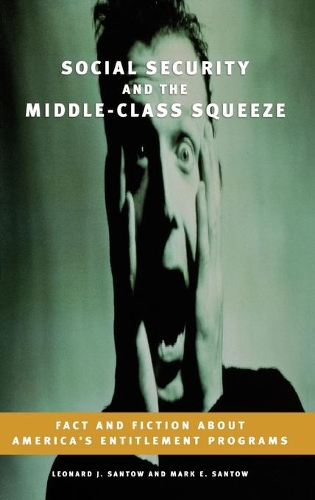
Social Security and the Middle-Class Squeeze: Fact and Fiction about America's Entitlement Programs
(Hardback)
Available Formats
Publishing Details
Social Security and the Middle-Class Squeeze: Fact and Fiction about America's Entitlement Programs
By (Author) Leonard J. Santow
By (author) Mark E. Santow
Bloomsbury Publishing PLC
Praeger Publishers Inc
30th September 2005
United States
Classifications
Professional and Scholarly
Non Fiction
Political science and theory
Political economy
368.4300973
Physical Properties
Hardback
232
Description
At the outset of his second term, President Bush's proposal to partially privatize Social Security has touched off a debate of enormous proportion. Disentangling the rhetoric and hyperbole from fact is essential for anyone trying to evaluate the potential merits or pitfalls of the plan. Leonard and Mark Santowa father-and-son team who integrate two different political viewpoints (fiscally conservative and socially liberal, respectively)offer specific recommendations for improving Social Security, Medicare, and Medicaid in socially responsible ways that relieve some of the stress on the middle class and promote upward mobility. Explaining sophisticated economic concepts in layman's terms, the Santows expose myths about how entitlement programs actually work, arguing, for example, that while the financial state of Social Security gets most of the press, Medicare and Medicaid are in much more serious trouble. They integrate conservative and liberal viewponts to propose a package of reforms that includes both tax cuts and increases and an overhaul of the government's economic forecasting system. Synthesizing mountains of data and explaining sophisticated economic concepts in layman's terms, the Santows expose myths about how entitlement programs actually work, arguing, for example, that while the financial state of Social Security gets most of the press, Medicare and Medicaid are in much more serious trouble. Moreover, they are highly critical of privatization plans, demonstrating that similar programs have failed in other countries and that such plans are programs are neither fiscally nor socially sound. If the American people value the common commitments that these programs embody, we will need to see them as a package, and fund them accordingly. In response to this challenge, the Santows integrate conservative and liberal viewpoints to propose a package of reforms that includes both tax cuts and increases and an overhaul of the government's economic forecasting system. Featuring a timeline of key events since Franklin Roosevelt signed the Social Security Act in 1935 and an appendix of data tables, the authors offer a primer for concerned citizens, policymakers, educators, students, and finance professionalsanyone with a stake in designing a system that pays for these essential programs in an equitable manner and contributes to our collective prosperity.
Reviews
The book has much to commend it, e.g., its convincing argument that the Social Security trust fund is meaningless, critique of official forecasts regarding the system, and warnings that Medicare reform deserves greater attention.General readers and upper-division undergraduate students. * Choice *
[A]n examination of the pressing social and economic problems of the American middle class and how they can be alleviated in an equitable and logical manner that will satisfy both the political right and the left. * Reference & Research Book News *
[A]n attempt to bridge the political and economic chasms that separate idea for solving the country's problems, the authors say they believe that Republicans and Democrats can sit down, make policies, admit mistakes and come up with solutions. * The Advocate and Greenwich Time *
The father-and-son team, who integrate two different political viewpoints (fiscally conservative and socially liberal), offer specific recommendations for improving Social Security, Medicare and Medicaid in socially responsible ways that relieve some of the stress on the middle class and promote upward mobility. * The Providence Journal *
Author Bio
Leonard J. Santow is Managing Director of Griggs & Santow Inc., an economic consulting firm in New York, whose clients include government agencies, central banks, investment and commercial banks, corporations, pension funds, insurance companies, government securities dealers, and money managers. He has served as Financial Economist for the Federal Reserve Bank of Dallas and on the boards of several investment committees and organizations. He is the author of The Budget Debate, Helping the Fed Work Smarter, and Social Security: What's Right, What's Wrong, What Needs to Be Done. Mark E. Santow is Assistant Professor of American History and a fellow at the Center for Policy Analysis at the University of Massachusetts, Dartmouth, specializing in 20th-Century American urban history, politics, and social policy. He has taught at the University of Pennsylvania, Fordham University, and Gonzaga University, and published numerous essays on segregation, urban policy, and the war on poverty. His book, Saul Alinsky and the Dilemmas of Race in the Post-War City, will be published in 2006.
